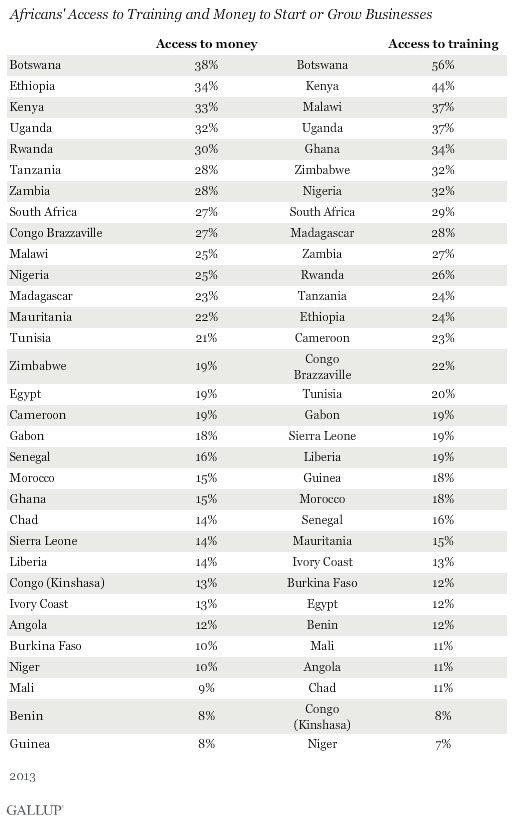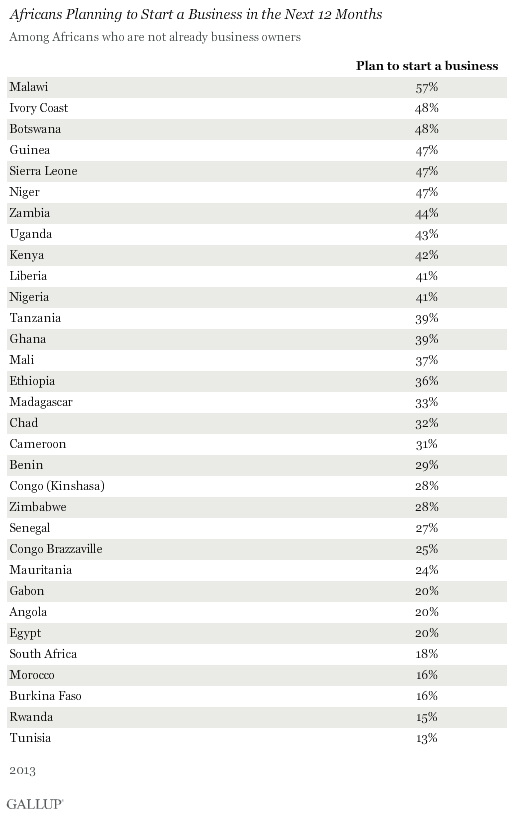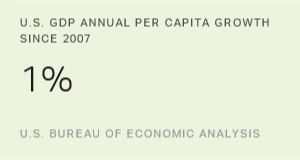This article is the third in a series that highlights key issues in Africa in relation to the first-ever U.S.-Africa Leaders Summit taking place in Washington, D.C., on Aug. 4-6.
WASHINGTON, D.C. -- Two in three Africans believe their communities are good places for people to start new businesses, which should be encouraging news as leaders discuss ways to increase trade and investment in Africa this week at the U.S.-Africa Leaders Summit. But this finding is tempered by the fewer than one in four Africans who say they have access to training (23%) or the money (22%) to start or grow a business themselves.

The degree to which access to training and money are potential barriers to entrepreneurship and job creation through private sector startups varies across the 32 countries that Gallup surveyed in 2013. Batswana are the most likely to say they have access to training (56%) and to money (38%) to start or grow a business. At the other end of the spectrum, only 7% of Nigeriens say they have access to training and 8% of Beninese and Guineans say they have access to money.
At the same time, nearly one in three Africans (32%) who are not already business owners say they are planning to start a business in the next year, far outpacing residents in any other region of the world. This relatively high entrepreneurial intent, despite the potential barriers of training and money, largely reinforces the reality that many entrepreneurs in Africa tend to be more necessity-driven than opportunity-driven.

Among Africans planning to start a business, 32% say they have access to training and 26% say they have access to money to start one. Not surprisingly, one's level of formal education plays an important role in who has access. Africans with nine or more years of formal education report much higher levels of access to both training and money than those with eight years or less.
When paired with more access to credit and training, Africans' entrepreneurial spirit could create private-sector job growth on the continent. African respondents who say they have access to training and money to start a business are nearly twice as likely to say that they are planning to start a business in the next year (52% and 50%, respectively) as those who do not (28% and 29%, respectively).
Bottom Line
Key objectives of the ongoing U.S.-Africa Leaders Summit are expanding trade and investment with Africa, and stimulating business growth, either through startups or as expansions. These objectives largely depend on access to training and money, which, relative to entrepreneurial intent, are in much shorter supply in Africa. Investments in education could be one way to shore up this deficit, and in turn bolster Africa's ability to grow its private sector.
Elizabeth Steele contributed to this report.
For complete data sets or custom research from the more than 150 countries Gallup continually surveys, please contact us.
Survey Methods
Results are based on face-to-face interviews with approximately 1,000 adults, aged 15 and older, conducted in 2013 in each country. For results based on the total sample of national adults across all 32 countries, the margin of sampling error ranged from ±1 percentage points to ±2 percentage points at the 95% confidence level. The margin of error reflects the influence of stratification and clustering in the surveys. In addition to sampling error, question wording and practical difficulties in conducting surveys can introduce error or bias into the findings of public opinion polls.
For more complete methodology and specific survey dates, please review Gallup's Country Data Set details.
